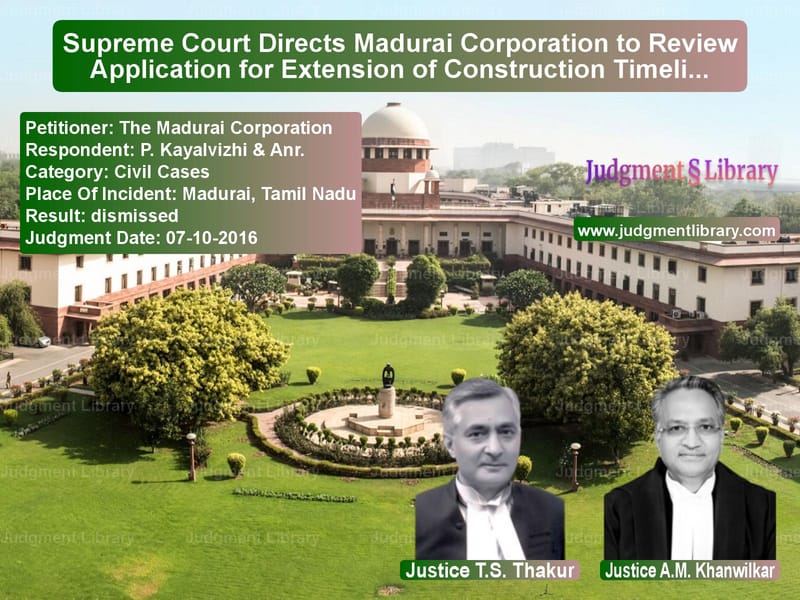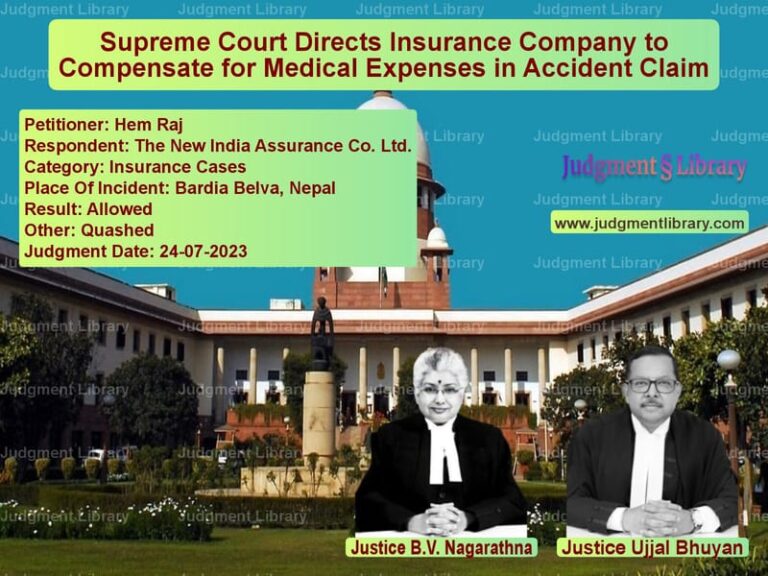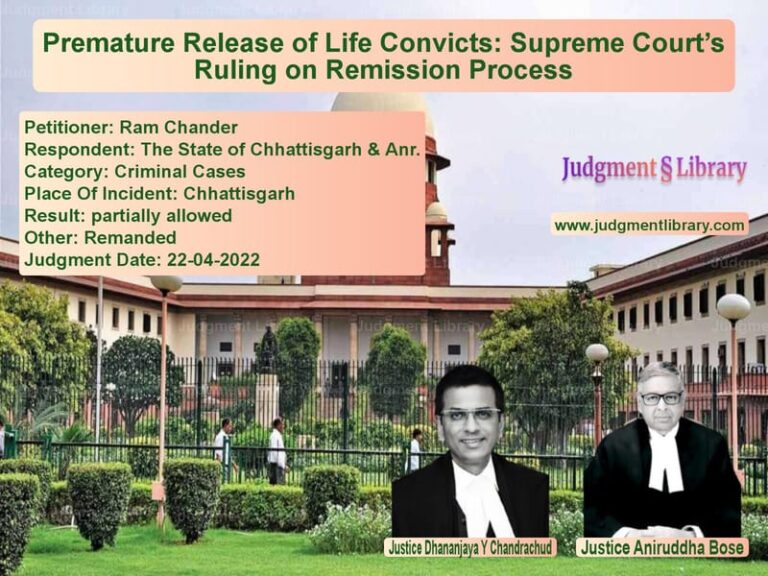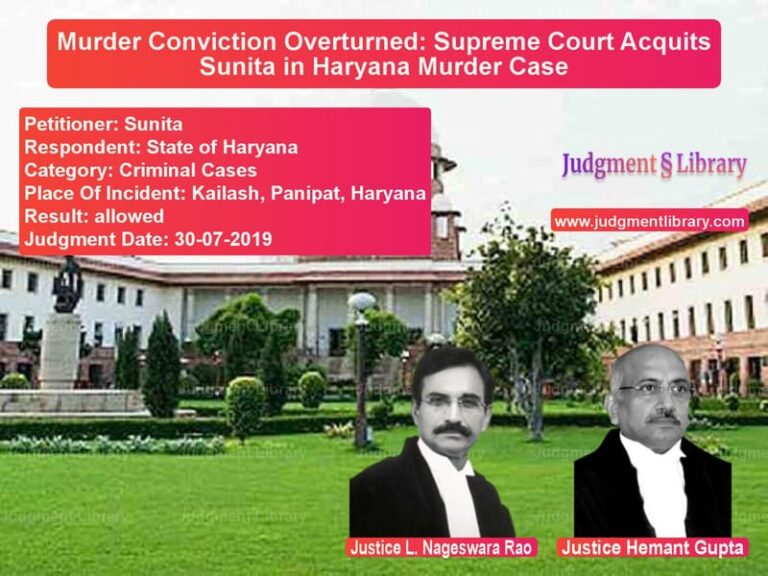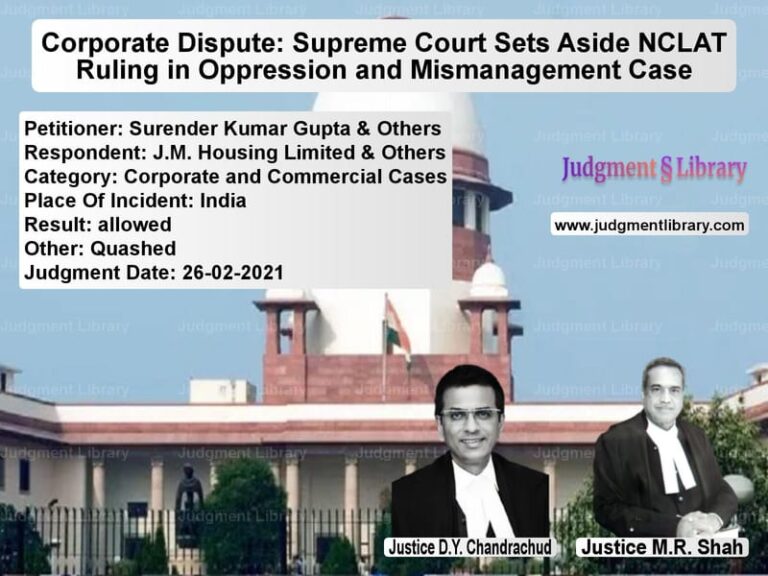Supreme Court Directs Madurai Corporation to Review Application for Extension of Construction Timeline
The Supreme Court of India, in the case of The Madurai Corporation v. P. Kayalvizhi & Anr., delivered an important judgment on October 7, 2016, concerning the construction of buildings in Madurai and the powers of local authorities regarding the extension of construction timelines. The case involved the respondent, who sought an extension to complete construction in accordance with an original building plan that was sanctioned by the Madurai Local Planning Authority. The appellant, Madurai Corporation, had rejected the request for an extension on the grounds of deviations from the sanctioned building plan. The Court ultimately disposed of the appeal and outlined specific steps for resolving the dispute.
Background of the Case
The dispute arose from the construction of a building by the respondent, P. Kayalvizhi, in Madurai, which was sanctioned under the Town and Country Planning Act by the Madurai Local Planning Authority. The construction was originally intended to be completed within two years, but the respondent could only complete six out of the eleven floors due to various reasons. As the deadline approached, the respondent sought an extension to complete the building in conformity with the original plan.
The Madurai Corporation, after reviewing the request, issued a notice pointing out several deviations from the original building plan, including the construction of a hall instead of a swimming pool and alterations to the lift and staircase. Despite these deviations, the respondent filed a petition, seeking renewal of permission to complete the construction up to the ground floor plus six floors.
Key Issues in the Case
- Whether the Madurai Corporation had the authority to grant an extension of time for the completion of the construction.
- Whether the deviations from the original plan could be remedied without further permission from the relevant authorities.
- Whether the respondent was entitled to continue the construction within the framework of the existing legal provisions.
Arguments Presented
Petitioner’s (Madurai Corporation) Arguments
- The appellant argued that the Municipal Corporation had no authority to grant an extension of time as the original sanction was granted by the Town Planning Authority under the Town and Country Planning Act.
- They further contended that the respondent had deviated from the approved plan in key areas, and it was not the responsibility of the Corporation to regularize such deviations.
- The appellant also raised concerns about the unauthorised construction of additional floors and alterations to the building design.
Respondents’ (P. Kayalvizhi’s) Arguments
- The respondent submitted that the deviations were minor and could be rectified within the stipulated time frame. They also asserted that the building could be completed as per the original plan, with modifications to comply with the requirements of the Corporation.
- The respondent emphasized that the work already completed up to the sixth floor was substantial and that the Corporation should grant an extension of time to complete the construction as originally planned.
- They assured the Court that the construction beyond six floors would not proceed, and the remaining work would focus on completing the building according to the approved plan.
Supreme Court’s Judgment
The Supreme Court ruled in favor of the respondent, outlining a process for the Madurai Corporation to review and act upon the respondent’s application for an extension of time to complete the building. The key aspects of the judgment included:
- On the Competency of the Corporation: The Court ruled that while the Town Planning Authority had originally sanctioned the building plan, the Madurai Corporation could, in fact, review and grant an extension of time under the relevant municipal rules. The Court emphasized that the authority of the Corporation to review the case was not limited to the original sanctioning body.
- On the Deviations: The Court noted that the respondent had undertaken to rectify the deviations pointed out by the Corporation, including issues related to the staircase and lift. The respondent also agreed to complete the construction as per the original plan up to the sixth floor, with no further work beyond that unless authorized.
- On Extension of Time: The Court directed that the respondent submit a formal written application to the Corporation, restating the undertaking made before the Court and agreeing to abide by any additional conditions set by the Corporation for granting an extension of time.
- On the Corporation’s Responsibilities: The Court directed the Corporation to assess the application thoroughly, ensuring that the construction met the terms of the original sanction, and pass an appropriate order within eight weeks.
The Court stated: ‘The Corporation is expected to act in a manner that ensures the safety of the building while allowing the respondent to complete the construction as per the original plan. The extension of time should be granted subject to any conditions necessary to remedy the deviations and ensure compliance with applicable rules.’
Key Legal Precedents Cited
- Rajendra Shukla v. State of Madhya Pradesh (2010): Established the principle that local authorities have the power to grant extensions for construction, subject to compliance with the original sanctioned plan.
- Hussain v. State of Kerala (2008): Affirmed that deviations from the approved plan must be regularized by the competent authority to ensure the safety and integrity of the construction.
- Shankar Singh v. Municipal Corporation of Delhi (2014): Clarified that municipal authorities have the discretion to extend timelines for construction work if the applicant complies with the statutory requirements.
Impact of the Judgment
The Supreme Court’s decision has far-reaching implications for municipal governance and building regulation:
- Clarification on Extension Powers: The ruling clarifies that local authorities like the Madurai Corporation are empowered to review and grant extensions for construction timelines even if the original sanction was granted by another authority.
- Importance of Compliance with Building Plans: Emphasizes that any deviations from the approved plans must be remedied, ensuring that the construction process remains compliant with municipal and safety regulations.
- Review of Public and Private Development Projects: The judgment reinforces the importance of carefully assessing applications for extensions of time, particularly in cases involving building safety and adherence to planning laws.
Conclusion
The Supreme Court’s ruling in The Madurai Corporation v. P. Kayalvizhi & Anr. highlights the need for clear procedures in granting extensions of time for construction projects. By directing the Madurai Corporation to reconsider the respondent’s application, the Court struck a balance between regulatory compliance and fairness, ensuring that construction projects can proceed while rectifying any deviations from the original plans.
This judgment serves as an important precedent for local authorities and developers in ensuring that building projects remain compliant with statutory requirements and safety standards, while also accommodating reasonable requests for time extensions when necessary.
Don’t miss out on the full details! Download the complete judgment in PDF format below and gain valuable insights instantly!
Download Judgment: The Madurai Corporat vs P. Kayalvizhi & Anr. Supreme Court of India Judgment Dated 07-10-2016.pdf
Direct Downlaod Judgment: Direct downlaod this Judgment
See all petitions in Property Disputes
See all petitions in Landlord-Tenant Disputes
See all petitions in Specific Performance
See all petitions in Judgment by T.S. Thakur
See all petitions in Judgment by A M Khanwilkar
See all petitions in dismissed
See all petitions in supreme court of India judgments October 2016
See all petitions in 2016 judgments
See all posts in Civil Cases Category
See all allowed petitions in Civil Cases Category
See all Dismissed petitions in Civil Cases Category
See all partially allowed petitions in Civil Cases Category

